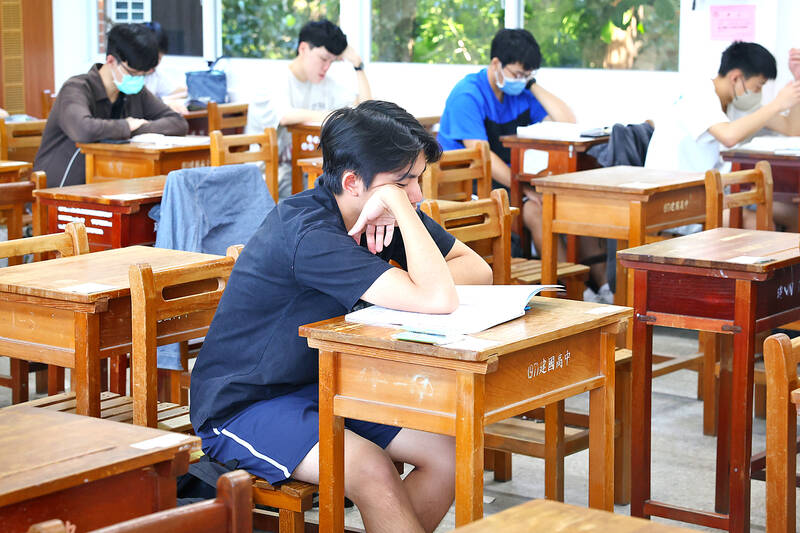Thge curriculum guidelines introduced by the government in 2019 has led to “learning fatigue” in children, the Child Welfare League Foundation said on Sunday, citing a recent survey.
The league announced its findings at a news conference Sunday to report on the academic progress of Taiwan’s students this year.
The survey suggests that 60 percent of the nation’s children are enrolled in after-school cram schools, the foundation said, adding that the number could be higher than 70 percent in cities.

Photo: CNA
About a quarter of students attend cram schools more than five days a week, with about 60 percent staying at their institutions until 9pm; and 20 percent attending classes until well after 10pm.
Considering that an average student takes two hours for study at home, those enrolled in cram schools could be doing school work for more than 10 hours learning a day — longer than most adults’ working hours.
The foundation said the survey results indicate that more than 93 percent of children sleep less than eight hours a day due to the amount of studying, while about 37 percent get five to six hours’ sleep a day, it said.
With so much time studying and too little sleep, students in Taiwan average only one hour of exercise a week, it said.
Moreover, the main source of stress observed in Taiwanese students comes from the high number of quizzes and tests in a standard week in both schools and cram schools.
On junior and senior high-school students specifically, league official Huang Yun-hsuan (黃韻璇) said that based on the foundation’s findings, the two main sources of students’ stress come from school work and worrying about their future.
The foundation attributed the problems to the “Curriculum Guidelines for 12-Year Basic Education,” officially introduced in 2019.
The foundation said the education plan’s aim was to provide a greater variety of classes for students to design their own curriculum.
Huang said the league’s latest statistics reveal there is still an excessive amount of cram school programs and tests, an on-going phenomenon observed around Taiwan — the focal point of students’ learning fatigue.
The government should re-examine extracurricular activities and curricula to provide students with a more well-rounded education, Huang said, adding that the 12-year plan is clearly unable to help the needs of Taiwan’s students.
With the survey showing that almost 60 percent of students are uncertain about their future prospects, Huang urged parents to pay more attention to their children’s physical and mental well-being, adding that the future achievements of Taiwan’s children should no longer be measured based on grades and diplomas.

‘DENIAL DEFENSE’: The US would increase its military presence with uncrewed ships, and submarines, while boosting defense in the Indo-Pacific, a Pete Hegseth memo said The US is reorienting its military strategy to focus primarily on deterring a potential Chinese invasion of Taiwan, a memo signed by US Secretary of Defense Pete Hegseth showed. The memo also called on Taiwan to increase its defense spending. The document, known as the “Interim National Defense Strategic Guidance,” was distributed this month and detailed the national defense plans of US President Donald Trump’s administration, an article in the Washington Post said on Saturday. It outlines how the US can prepare for a potential war with China and defend itself from threats in the “near abroad,” including Greenland and the Panama

A wild live dugong was found in Taiwan for the first time in 88 years, after it was accidentally caught by a fisher’s net on Tuesday in Yilan County’s Fenniaolin (粉鳥林). This is the first sighting of the species in Taiwan since 1937, having already been considered “extinct” in the country and considered as “vulnerable” by the International Union for Conservation of Nature. A fisher surnamed Chen (陳) went to Fenniaolin to collect the fish in his netting, but instead caught a 3m long, 500kg dugong. The fisher released the animal back into the wild, not realizing it was an endangered species at

The Chinese Nationalist Party (KMT) is maintaining close ties with Beijing, the Democratic Progressive Party (DPP) said yesterday, hours after a new round of Chinese military drills in the Taiwan Strait began. Political parties in a democracy have a responsibility to be loyal to the nation and defend its sovereignty, DPP spokesman Justin Wu (吳崢) told a news conference in Taipei. His comments came hours after Beijing announced via Chinese state media that the Chinese People’s Liberation Army’s Eastern Theater Command was holding large-scale drills simulating a multi-pronged attack on Taiwan. Contrary to the KMT’s claims that it is staunchly anti-communist, KMT Deputy

The High Prosecutors’ Office yesterday withdrew an appeal against the acquittal of a former bank manager 22 years after his death, marking Taiwan’s first instance of prosecutors rendering posthumous justice to a wrongfully convicted defendant. Chu Ching-en (諸慶恩) — formerly a manager at the Taipei branch of BNP Paribas — was in 1999 accused by Weng Mao-chung (翁茂鍾), then-president of Chia Her Industrial Co, of forging a request for a fixed deposit of US$10 million by I-Hwa Industrial Co, a subsidiary of Chia Her, which was used as collateral. Chu was ruled not guilty in the first trial, but was found guilty